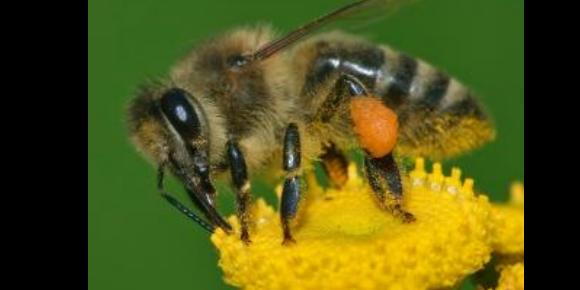Vaccines for Bees?

- posted: Jan. 26, 2019
Vaccines for Bees?
No one likes to be stung by a bee, but the truth is, that honeybees are vital to agricultural systems throughout the world. Bees pollinate nearly 80% of the plants on earth. Without bee pollination, many plants cannot grow. This could lead to a global food crisis if bee populations continue to decline due to various infections and parasites causing what is known as colony collapse. While colony collapse thankfully seems to be decreasing in recent years, there are still many issues that can affect honeybees.
Two female scientists in Finland, Dr. Dalial Freitak and Dr. Heli Salmela have developed a way to control one infection known as American foulbrood which is caused by a bacterial infection. The doctors working on the project discovered a novel way of delivering a type of vaccine to bees. They found that if the queen bee in a colony was fed the bacteria, certain molecules on the bacteria will bind to a protein in the bee known as vitellogenin. The vitellogenin then carries the molecules into the queen bee’s eggs thus “vaccinating” or passing on protection to future generations of bees. Bees do not have antibodies in their immune systems, so it was initially not thought that they could be vaccinated against disease. The discovery of this protein makes vaccination a reality.
The vaccine is administered to the queen bee of a colony in a sugar cube which she eats, and it is then passed via the protein to her eggs. Newly hatched bees are effectively vaccinated against the bacteria. The vaccine is still in its early stages and more testing on safety and efficacy are underway, but it looks promising and it can potentially be applied to other infections affecting bees.
Besides vaccines, there are other ways to help save the bees. We can all do our parts. Don’t spray your yard with pesticides. Many pesticides are toxic to bees. Plant bee-friendly plants to encourage bees to visit and pollinate flowers and buy local honey whenever possible.
This blog brought to you by the Patton Veterinary Hospital serving Red Lion, York and the surrounding communities.
https://www.americanveterinarian.com/news/buzzworthy-news-firstever-vaccine-for-insects
https://www.americanveterinarian.com/news/buzzworthy-news-firstever-vaccine-for-insects
http://beeaware.org.au/archive-pest/american-foulbrood/#ad-image-0
Location
Patton Veterinary Hospital
425 E Broadway
Red Lion, PA 17356
